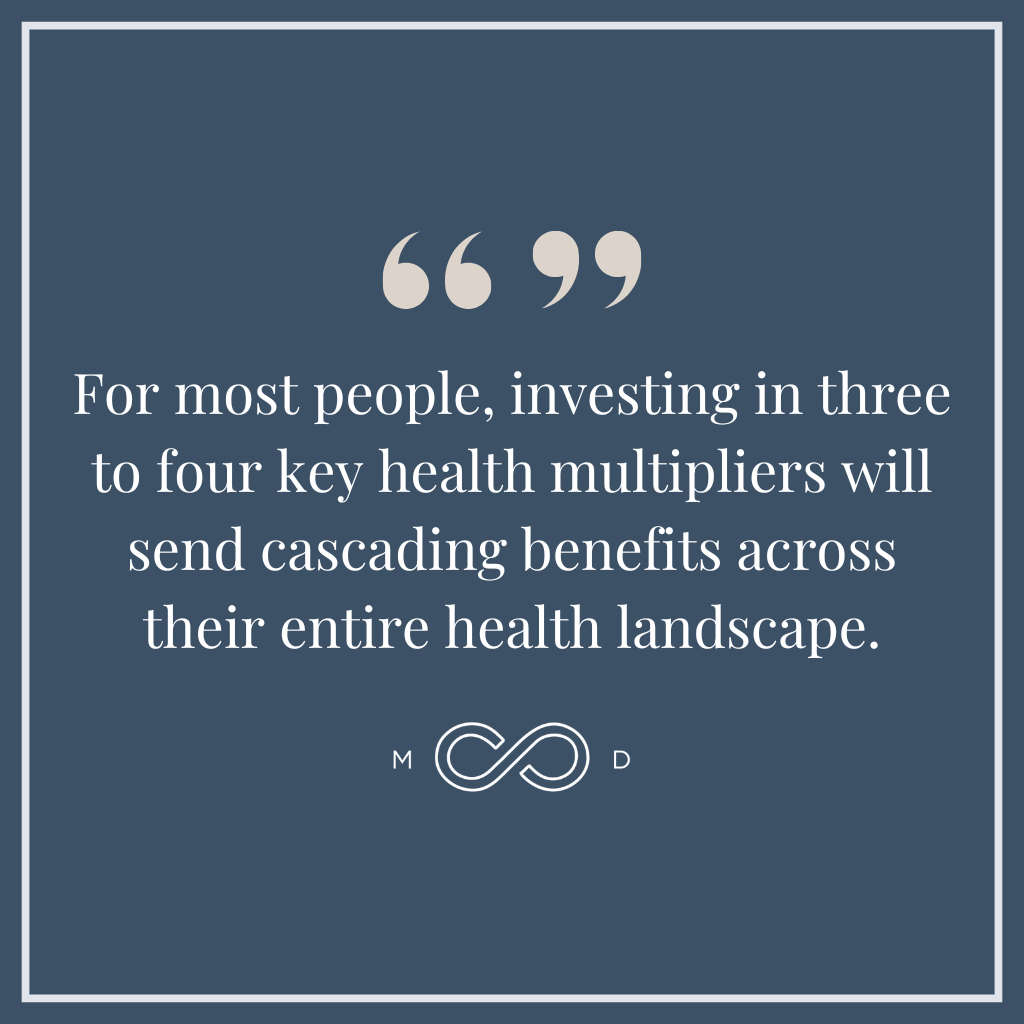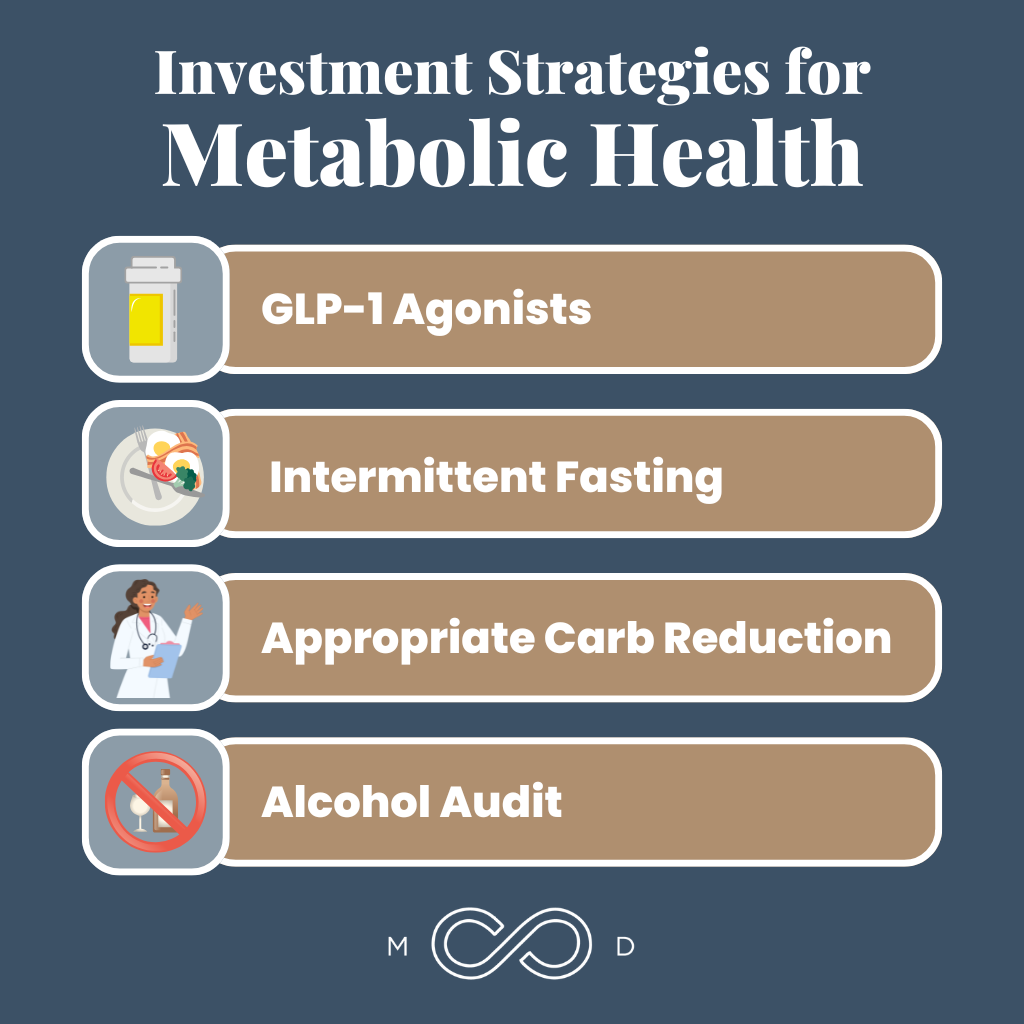Download file | Play in new window | |
In the world of health optimization, we’re bombarded with an overwhelming array of options: new supplements, trendy diets, cutting-edge devices, and wellness practices.
With so much information, it’s easy to get lost in the minutiae and miss the most basic factors that truly make a difference.
What I’ve discovered through years of working with patients is surprisingly simple: most health challenges are either avoidable or reversible if you focus on the right things.
You don’t need to perfect 27 new health habits. For most people, investing in three to four key health multipliers will send cascading benefits across their entire health landscape.
Take an Investment Approach to Health
Health, much like wealth, follows compound interest principles. What you do today determines your trajectory years and decades from now. This is why I encourage thinking about health as an investment — of time, attention, and resources.
What I don’t mean here is becoming health-obsessive. I simply mean bringing some intentionality to your health using 5–10% of your discretionary attention each day. This small percentage shouldn’t be disruptive to essentials like family, business, or charitable work.
If you’re a high-achiever with multitude commitments, you might view reserving even a small fraction of your day as selfish. But here’s the secret: In the micro, you have to matter the most. Otherwise, you can’t preserve your usefulness in the macro. When you prioritize yourself in small but crucial ways, the other 95% survives to continue benefiting others.
Like fiscal investments, health investments earn compound returns over time. But there’s the rub: “over time.” If you don’t stop to make your deposits each day, you’ll have nothing to withdraw in terms of quality and length of life down the road.
We’re all vulnerable to the seductive thought, I’ll focus on my health next year. But the truth is, nobody rallies. Your health will continue to get punted until something frightening crops up. The time to invest in your health is before you have to.
Let’s talk about some of the valuable health multipliers I take time for in my life and encourage others to consider as well.
Sleep: The Overlooked Foundation
Sleep has become my number one health multiplier. When you consider that we spend approximately one-third of our existence asleep, it’s remarkable how quickly we dismiss its importance.
I used to think sleep didn’t matter all that much. Surrounded by high-achievers who seemed to view missed sleep as a badge of honor, I absorbed the cultural message that sleep was for the weak. In academia, the military, and other high-performance environments, sacrificing sleep is often celebrated as a mark of grit and dedication.
In daily life, sleep is often the first thing we sacrifice when facing competing commitments. We even teach it to our children; when pressed for time with homework, sports, or social activities, we allow sleep to become the disposable element.
Though we don’t fully understand all that happens during sleep, we know it’s critical for hormonal regulation, memory processing, and cognitive function, among other benefits. This is why I now track my sleep meticulously.
I haven’t found a more reliable way to induce behavior change than near-immediate feedback, which modern wearable technology provides. Devices like the Oura Ring and Whoop provide excellent sleep tracking, as well as data on exercise, recovery, and more.
Waking up to objective data about your sleep quality and quantity creates a natural curiosity: “I wonder what caused that poor sleep? Was it the late meal or those extra glasses of wine?”
A playful, curious approach to data tends to be positive, especially if sleep quality has been a blind spot for you. Of course, use caution if you tend to have an obsessive bent, or these devices could turn into death-by-data for you.
Beyond Calories: Rethinking Metabolic Health
Another belief I’ve revised is that weight management is primarily a math problem. I was trained to view weight loss through the simple lens of “calories in, calories out,” and I firmly held to that dogma for years.
My current understanding is more nuanced. Calories do matter, primarily early in the game, before metabolic dysfunction sets in. However, once your metabolic engine develops inefficiencies and hormonal imbalances emerge, biochemistry becomes integral. In other words, the type of calories and their hormonal impact matter tremendously.
Let’s talk about how to address that.
GLP-1 Agonists
Because of the rampant need for a biochemical approach to weight loss and metabolic change, I’m optimistic about GLP-1 agonist medications. While all drugs have downsides — even Tylenol is deadly at the wrong dose — GLP-1 agonists may be the most significant pharmacologic breakthrough since penicillin.
Why would I say such a thing? It may sound dramatic, but metabolic disease is unquestionably driving our most pressing health crises. It underlies top killers like cardiovascular disease, many cancers, and perhaps even dementia. We’re likely just a few years away from renaming Alzheimer’s as “type 3 diabetes” as we further uncover its connection to insulin resistance in the brain.
For the first time, however, we have a pharmacologic tool that addresses the root cause of metabolic dysfunction. So, while I’m not usually one to reach for a pill (or an injection, in this case) first, the truth is metabolic disease is destroying health at an alarming rate. This is the lens through which I’m analyzing the risk-benefit ratio of GLP-1 drugs.
When used appropriately with proper medical oversight, GLP-1 agonists have tremendous potential to fight metabolic disease. They require intentional, strategic management — particularly protein intake and micronutrient supplementation — to ensure healthy outcomes.
Now, do these drugs have a dark side? Of course. And they have side effects, which need to be carefully managed and monitored. Can they be misused? Certainly. Could I be wrong about them? Yes. But with what we know at this point, I’m optimistic about the impact they could have in drastically reducing and reversing metabolic disease and all the attendant illnesses that come along with it.
Intermittent Fasting
Human beings weren’t meant to eat all day every day. When we do, our systems simply can’t cope. The constant release of insulin to address blood sugar spike after blood sugar spike renders our cells increasingly insensitive, requiring more and more insulin to do the same job. The eventual result? Diabetes.
Most people would benefit from establishing a minimum 12-hour window each day of not eating, though not going longer than 24 hours. This type of intermittent fasting is one of the fastest ways to stabilize blood sugar and improve insulin sensitivity, and is particularly beneficial for those with excess weight or metabolic concerns.
Often, simply changing when you eat rather than what you eat allows your body’s biochemistry to recover its intended functions.
Appropriate Carbohydrate Reduction
Restricting carbohydrate intake is a popular — and effective — method of reducing “calories in” while also addressing biochemical factors.
I’m sometimes asked whether plans like the ketogenic diet are healthy approaches. Biochemically, keto is impressive and can potentially facilitate real progress. However, I have two caveats:
- I don’t feel eliminating an entire macronutrient category is healthy for the long term.
- Keto is only effective if you can stick to it in a healthy way.
Personally, I find keto difficult to follow. I prefer more protein than keto allows, which takes me out of ketosis. For me, the diet is strict in a way where I don’t thrive.
That said, if keto works well for you, fantastic. The main qualification for whatever metabolically healthy diet you choose is simply that it matches your goals, preferences, and ability to follow it.
My lingering caution is this: As an elimination diet, keto removes a full third of macronutrients from your nutrition. So while it can be beneficial in the short-term, the long-term elimination of entire food categories comes with trade-offs.
Alcohol Audit
If you consume alcohol regularly and aren’t where you want to be health-wise, consider examining your alcohol intake. Beyond the common worry over alcohol’s “empty calories” (I’m looking at you, craft beer), alcohol inhibits executive function, affects eating decisions, and severely disrupts sleep quality.
The latter is a surprise to many people since alcohol actually helps them fall asleep. But staying asleep — and moving through the proper sleep cycles — involves an entirely different physiology, which alcohol devastates.
I’m not here to guilt anyone into swearing off alcohol. Rather, I’d suggest that if you’re sensing any friction in this area, you might want to consider your intake further. A simple, practical approach I often recommend is to reduce your consumption by 50%, either in frequency (days per week) or in volume per occasion.
Personally, I never drink more than four days per week and never more than two drinks per occasion. These clear boundaries eliminate negotiation with myself and provide a sustainable framework.
Find Your 3 to 4 Game-Changers for Long-Term Health
Most people get the same diseases as they age because they eat the same foods and follow the same patterns their whole lives. To break free from average outcomes, you have to break the average pattern.
This doesn’t mean you need to obsess over your health all day every day. Just identify three to four health multipliers that create the greatest impact on you personally. Whether it’s the multipliers mentioned in this post or multipliers from elsewhere, these interventions create cascading benefits that address numerous downstream issues simultaneously, making enormous impact without upending your whole life.
The most important thing to remember is that most health challenges are avoidable or reversible. Even if you’ve already developed metabolic dysfunction, for example, improvement is possible — often dramatically so.
For this reason, your health outlook can be overwhelmingly positive, even if everything isn’t perfect today. Focus on key personal health multipliers, apply them consistently, and watch as your health trajectory transforms over time.

Dr. Aaron Wenzel is a concierge physician specializing in the care of fast-moving entrepreneurs, executives, and public figures in the Nashville, TN area. Dr. Wenzel’s diverse life experience and extensive training in family medicine, emergency care, nutrition, and hormone replacement therapies give him the unique platform to provide unmatched care for his patients.









